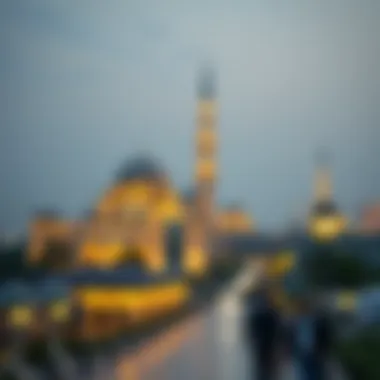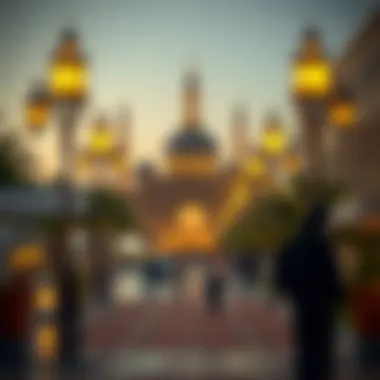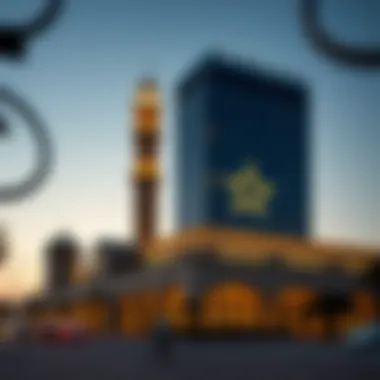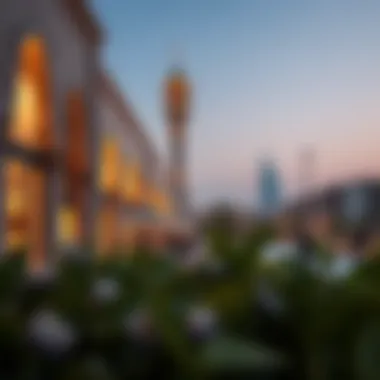Ramadan 2023 Iftar Times in Dubai: Impact and Insight


Intro
Ramadan, a month of fasting and spiritual reflection for Muslims, holds a unique place in Dubai's vibrant tapestry. As the sun sets, the call to prayer signals the time for Iftar, marking the breaking of the fast. This act is not merely a ritual but deeply intertwined with various aspects of daily life in the emirate.
In 2023, Iftar timings in Dubai have gained even more relevance, not just for their sacred purpose but also for their impact on social interactions and business dynamics. Real estate, an essential sector in the UAE, feels the ripple effects of this holy month, as residents and expatriates adjust their lifestyles, routines, and schedules around these critical moments.
In this article, we will delve into the significance of Iftar timings, how they harmonize with daily operations, and their broader implications for the local real estate market. The goal is to provide a comprehensive understanding of not just when Iftar occurs in 2023 but what that means for those living in or investing in the burgeoning landscape of Dubai.
Market Analysis
A closer look at Dubai's real estate during Ramadan reveals intriguing patterns influenced by the unique cultural practices surrounding Iftar. Observing these trends offers valuable insights into how the market responds to the rhythm of lifting the fast.
Current Trends in Dubai Real Estate
The real estate market in Dubai is experiencing a resurgence, particularly during Ramadan. With expatriates and residents often gathering for Iftar, there's a noticeable increase in demand for properties completed with communal spaces both for socializing and dining. Developers are recognizing this shift, tailoring their offerings to meet the needs of those looking to celebrate the month in style.
- New apartments with spacious balconies and communal dining areas are attracting attention.
- Luxury villas with expansive outdoor spaces are becoming popular for Iftar gatherings.
- Nearby areas offering easy access to mosques and community centers are favored.
Price Dynamics and Forecasts
The implications of Iftar schedules extend to pricing dynamics as well. As demand fluctuates based on lifestyle shifts during Ramadan, investors are keenly watching how these cycles affect property valuations.
- Prices are showing an upward trend as more people seek homes conducive to hosting visitors.
- Short-term rental opportunities around Iftar hotspots are surging, leading to discussions about potential investment returns.
"The impact of cultural practices like Iftar on real estate dynamics can't be overstated; it shapes not just living spaces but entire neighborhoods."
One must takeaway that understanding these effects is crucial for potential homebuyers and investors looking to navigate the Dubai market effectively during Ramadan. As routines shift, so too do opportunities.
Investment Opportunities
With heightened activity and emergent needs during Ramadan, astute investors can identify lucrative opportunities within the realm of Dubai's real estate.
Insights on High-Return Investments
Investors should focus on areas that align with the spirit of Ramadan. Properties that facilitate community and connection are poised for appreciation and demand.
- Mixed-use developments that offer dining, leisure, and residential spaces are highly favored.
- Areas near popular iftar venues could see a spike in rental potential, particularly for expatriates hosting family and friends.
Emerging Neighborhoods for Expatriates
Regions like Dubai Creek Harbour and Al Furjan are attracting attention, dominated by spaces designed for social gatherings during Ramadan. These neighborhoods provide an ideal blend of residential comfort and accessibility.
- The community feel they offer is nurturing during the holy month, making them desirable to newcomers.
- Ease of access for daily Iftar gatherings adds to their appeal.
As Ramadan progresses, those engaging in the local real estate scene must keep a keen eye on market movements and consumer preferences. Staying informed can lead to significant advantages in both short-term and long-term investments, especially around the pivotal moments of Iftar.
Preface to Ramadan in Dubai
Ramadan holds a special place in the hearts of many across the globe, and in Dubai, this sacred month transforms the atmosphere into a tapestry of spiritual reflection and communal bonds. Here, it is not just about abstaining from food and drink during daylight hours; it encompasses a broader rhythm that affects every aspect of life. For residents and visitors alike, understanding Ramadan—specifically how it integrates with daily routines and societal customs—is key to fully appreciating its profound significance.
Understanding the Essence of Ramadan
At its core, Ramadan is a time for introspection, devotion, and strengthening one’s relationship with faith. This month-long observance serves as a period to acknowledge one’s blessings and cultivate empathy for those who are less fortunate. In Dubai, where a melting pot of cultures converge, the essence of Ramadan is experienced through various communal events and philanthropic initiatives.
During these days of fasting, the local community often comes together for iftar meals, which break the fast at sunset. This ritual acts as a bridge between people, fostering connections irrespective of cultural or religious backgrounds. Residents get a glimpse into diverse traditions and practices, strengthening societal bonds.
Additionally, as evening arrives, the skyline of Dubai transforms—the sounds of prayers resonate through the air, and the gentle illumination from mosques reflects the spirit of Ramadan. The ambiance changes drastically, illustrating the shift from daily life to a more contemplative and united atmosphere, highlighted by neon lights and bustling gathering spots.
Role of Iftar in Ramadan Observance
Iftar is not merely a meal; it's a fundamental part of the day that encapsulates the spirit of Ramadan. Aligned with the call to prayer at sunset, the Iftar meal signifies the end of the day's fast and marks a treasured moment of togetherness with family and friends. It’s typical to see families gathering around their tables, sharing stories and laughter, often featuring a delightful array of dishes that reflect both traditional and contemporary influences.
The act of breaking bread in such a heartfelt manner underscores the importance of gratitude and sharing within the community. Many people also choose to host larger gatherings, inviting neighbors or even individuals who might be away from their families during this time. This community-oriented approach serves as a reminder of the universal principles of compassion and cooperation—the very fabric that binds societies together.


In an urban landscape like Dubai, Iftar brings along various culinary experiences, with restaurants and hotels offering special buffets, each aiming to create a warm environment for shared dining. The excitement in about planning these communal experiences builds anticipation among the populace, as traditional foods are often complemented by new trends, catering to varying tastes.
In summary, understanding Ramadan in Dubai moves beyond the act of fasting—it encompasses a deeper appreciation of cultural, social, and spiritual dimensions that shape the community, creating a rich environment for all who partake in this holy month.
Iftar Timing: An Overview for
Understanding the Iftar timing is crucial, particularly during the month of Ramadan, when Muslims globally engage in fasting from dawn until sunset. In Dubai, the significance of Iftar extends beyond a mere meal; it reflects cultural heritage and social customs, serving as a moment of gathering for families and communities. Knowing the specific Iftar times helps individuals plan their daily schedules while maintaining the sanctity of fasting.
This overview addresses how Iftar timings operate in 2023 and the factors that contribute to these timings. It also highlights the implications for various aspects of life in Dubai, such as social gatherings and even potential real estate trends.
Calculation Methods for Iftar Times
Iftar times are primarily determined based on the sunset, which can vary slightly each day due to factors like geographical location and time zone. Various methods exist to calculate the exact moment of sunset, and these methods are widely accepted in the Islamic community.
- Astronomical Calculations: These are done by calculating the sun's position. Tools like the Islamic Society of North America (ISNA) or Umm al-Qura University in Saudi Arabia provide precise timings based on geographical coordinates.
- Local Observances: In some cases, local mosques might follow traditional practices, visibly marking the time of sunset with the call to prayer.
- Mobile Apps and Websites: Nowadays, many people use apps and websites to easily find accurate Iftar timings for their locality. Popular choices include Muslim Pro and AlAdhan.
Understanding these methods allows community members in Dubai to participate in Iftar with confidence, ensuring that meals are served when the time is right.
Specific Iftar Times in Dubai for
In 2023, Iftar times in Dubai are closely correlated with sunset, gradually shifting as the days progress. Here’s a breakdown of the approximate Iftar timings for key dates during Ramadan:
- March 23: 6:25 PM
- March 24: 6:26 PM
- March 25: 6:27 PM
- March 26: 6:28 PM
- April 1: 6:30 PM
- April 10: 6:37 PM
The above timings can vary slightly depending on the day's weather conditions. As one day leads into another, the community gathers for Iftar, emphasizing the importance of breaking fast together. This not only serves as a physical nourishment but also fosters emotional connections among friends and family.
By being aware of these specific times, individuals and families can synchronize their activities, enhancing the communal aspect of the evening meal while respecting the spiritual significance of Ramadan.
Cultural and Social Significance of Iftar
The importance of Iftar during Ramadan extends far beyond merely breaking the fast at sunset. In Dubai, a melting pot of cultures and traditions, Iftar serves as a microcosm of social cohesion and cultural expression. During this holy month, the act of gathering for Iftar transforms into a rich tapestry of shared experiences that brings together families, friends, and communities. Observing the Iftar ritual signifies more than religious observance; it fosters a sense of belonging and unity, which are vital in a diverse society like Dubai.
Iftar as a Family Gathering
Iftar is often marked as a cherished family affair, surfacing the essence of togetherness that might be overshadowed during the fast-paced routine of daily life. In homes across Dubai, families gather around tables laden with traditional dishes, each stewed with the memories and flavors passed down through generations. Ingredients like dates, lentil soup, and savory meats symbolize warmth and hospitality, allowing loved ones to unwind together, share stories, and strengthen familial bonds.
Think of it as a culinary reunion where culinary delights meet heartfelt conversations. Many families even set aside certain evenings to create specialized Iftar menus that highlight regional recipes or modern twists on authentic flavors. This practice not only fosters culinary creativity but also teaches younger generations the importance of appreciating their heritage and passing it down.
- Strengthening Bonds: The very essence of Iftar as a family gathering lies in its ability to strengthen relationships. From the laughter shared over meals to the collective prayers said, the togetherness experienced during Iftar reinforces family ties in a fast-evolving urban landscape.
- Traditions and Memories: Families often incorporate traditions such as inviting extended families or neighbors to join in the feast. This opens doors for new relationships and nurtures existing ones. The stories exchanged at Iftar tables often encapsulate the spirit of what it means to live in Dubai—a blend of cultures, traditions, and personal anecdotes.
"In Dubai, Iftar brings together the warmth of family and the flavors of home, reminding everyone that the bonds we share are as fulfilling as the meals we enjoy together."
Iftar in Community Settings
The communal aspect of Iftar transcends individual households, radiating into community gatherings throughout Dubai. Parks, mosques, and community centers often host large Iftar events, creating opportunities for residents to engage with one another in an inclusive environment. These community Iftars are examples of shared solidarity, where individuals from different backgrounds come together to celebrate a common purpose.
Such gatherings encourage social interaction, breaking down barriers and inviting everyone to partake in the feast.
- Civic Responsibility: Many organizations and mosques take it upon themselves to host these communal Iftars, reminding participants of the values of charity and community service. These events often include distribution of free meals to those less fortunate, emphasizing that the spirit of Ramadan extends to everyone.
- Cultural Exchange: Attending an Iftar in a broader community setting allows attendees to experience various culinary traditions, providing a unique opportunity for cultural exchange. An Emirati family might share their traditional Qamar al-Din while a South Asian neighbor brings samosas, creating a banquet of culinary diversity that reflects Dubai's global fabric.
In essence, the cultural and social significance of Iftar in Dubai encapsulates the spirit of unity and diversity, marrying tradition with the pulse of contemporary life. It is within these moments—whether around a family table or at a community feast—that the essence of Ramadan truly shines.
Impact on Daily Life in Dubai
During Ramadan, the daily routine of residents and expatriates in Dubai undergoes a significant transformation. The rhythms of life shift, aligning closely with the timings of Iftar, the evening meal that breaks the fast. These adjustments spotlight the influences of culture and religious observance on day-to-day activities.
One critical element to consider is the influence on workplace dynamics. As the sun sets, many Muslim employees eagerly anticipate the hour to break their fast, leading to modified work schedules. Companies often adjust their hours, ensuring employees can leave in time to partake in the communal aspect of Iftar. In this context, workplaces may adopt shorter hours or even staggered schedules. As a result, productivity can be impacted, but this is often seen as a temporary trade-off for cultural relevance and employee well-being.
Another aspect is the communal gatherings that become a part of the social landscape. After a day of fasting, families and friends come together for Iftar, creating an atmosphere of connection that is hard to replicate outside of Ramadan. Each neighborhood can be seen alive with bustling streets and shared meals, reinforcing the community spirit. Many restaurants cater to Iftar dinner, showcasing the culinary diversity of Dubai with special menus that honor local traditions.
Workplace Adjustments during Ramadan
The adjustments in the workplace reflect the deeper commitment to respecting the traditions of the season. With shortened work hours in place, leaders and managers find themselves navigating the logistics of productivity while ensuring the well-being of their staff. Some organizations implement flexible hours, allowing employees to start and finish at times that suit their fasting and non-fasting colleagues.


- Flexible working arrangements could include:
- Adjusted start times
- Extended lunch breaks before the fast ends
- Remote work options for non-essential roles
Additionally, the environment in the workplace may change. Office décor might incorporate festive elements, and team morale often receives a boost from communal iftars, fostering a sense of belonging among coworkers.
After Iftar Activities and Dining Out
As night falls, Dubai pulses with life, particularly after Iftar. The evening is a prime time for social engagement, and you'll often find families heading out to enjoy a meal together. Many restaurants are fully booked, as people flock to dining establishments to share these special moments. In fact, the emerging dining scene during Ramadan is not only about enjoying food; it is about experiencing the lively atmosphere that envelops the city.
It is not uncommon for restaurants and hotels to feature elaborate buffets that celebrate local cuisine and international flavors. Diners can partake in anything from traditional Emirati dishes to global culinary trends, reflecting Dubai’s multicultural fabric. The diverse options cater to families seeking variety as well as food lovers eager to explore new tastes.
This trend leads to a flourishing restaurant economy, especially with establishments showcasing special Iftar menus, featuring reduced prices to encourage group gatherings. Food trucks and street vendors also capitalizing on the after-Iftar rush, adding vibrant flavors to Dubai’s culinary landscape.
In summary, Ramadan's impact on daily life in Dubai serves as a vivid reminder of the cultural value placed on communal experiences, workplace flexibility, and the shared joy of breaking bread often transcending regular life. The blend of work and relaxation during this period fosters a uniquely enriching atmosphere that resonates throughout the entire emirate.
Real Estate Considerations During Ramadan
In a city as dynamic as Dubai, the impact of Ramadan extends beyond the spiritual realm into various sectors, not least real estate. As the holy month approaches, the rhythm of life changes, influencing rental demand and property sales trends. Understanding these shifts helps buyers, investors, and agents alike navigate this unique landscape. Observing and anticipating these changes remain crucial, particularly for those keen on understanding how Ramadan interplays with real estate dynamics.
Shifts in Rental Demand and Supply
During Ramadan, rental demand in Dubai experiences notable fluctuations. Traditionally, there is an uptick in inquiries for short-term rentals, driven by both locals and expatriates seeking to enjoy the iftar experience together or accommodate family members visiting for the holy month. This pattern often leads landlords to adjust their leasing strategies, raising rents on desirable properties that cater to larger groups.
On the supply side, some landlords opt to offer reduced rates or even special Ramadan packages to attract tenants. This tactic aims to maintain occupancy levels, especially in areas with high competition among property listings. The implementation of flexible rental contracts can also become a trending offer during this time, allowing tenants to stay only for the month if needed, catering predominantly to families who might otherwise stay in hotels.
"Real estate agents often report an increase in foot traffic as potential tenants search for ideal accommodations during this vibrant month."
A few notable areas such as Dubai Marina and Jumeirah Beach Residence witness a spike in demand, as many residents prefer locations that offer easy access to communal iftar gatherings. In contrast, quieter neighborhoods may see a dip in demand, as many residents opt for high-energy areas that offer more Ramadan-themed activities.
Impact on Property Sales Trends
Ramadan does not only affect the rental market, but it also leaves its mark on property sales trends. Typically, the month witnesses a patient, contemplative buyer. Families and individuals often postpone major purchasing decisions until after the festivities are over. This trend can lead to a slowdown in sales activity, as many potential buyers are engaged in personal and communal celebrations rather than property viewings.
However, this lull can present unique opportunities for savvy investors who recognize that true market value can emerge from this dip. Properties that may not have seen much traction during the busy season can become attractive deals during Ramadan, as sellers who are eager to conclude transactions might lower their asking prices.
Investors keen on securing bargains often engage in negotiations with an eye towards post-Ramadan peaks. Understanding this cycle—when buyers are poised to return to the market in larger numbers after Eid—enables analysts and agents to better position their listings and strategies.
Furthermore, there can be a buzz kindled around newly launched projects or special financing offers during this month, igniting renewed interest once Ramadan concludes. Awareness of these nuances in the property sales environment during Ramadan is paramount for anyone aiming to make informed choices in the Dubai real estate arena.
Restaurants and Iftar Offerings
As Ramadan 2023 rolls into Dubai, the culinary scene comes alive with an array of Iftar offerings that reflect the rich tapestry of the city’s culture and heritage. Dining establishments across Dubai are not just places to eat; they serve as community hubs where families gather, friendships are strengthened, and traditions are honored. The significance of these restaurants during Ramadan cannot be overstated; they provide an essential service that caters to the unique needs of those who fast.
Popular Iftar Buffets in Dubai
One of the most anticipated aspects of Ramadan is the arrival of * lavish Iftar buffets* at renowned restaurants. These buffets showcase a delightful array of traditional Arabic dishes, international cuisines, and local specialties, offering a culinary experience that is both satisfying and celebratory. Notable venues like the At.mosphere restaurant, situated on the 122nd floor of the Burj Khalifa, offers a breathtaking view alongside an elaborate Iftar menu featuring everything from hummus and tabbouleh to delectable dates and sweets.
In neighborhoods like Jumeirah, the Al Qasr Hotel provides an Iftar buffet characterized by opulent decor, creating an environment that feels almost regal. Diners are encouraged to savor spiced lamb, grilled seafood, and a host of desserts including kunafa and baklava that invoke the spirit of Ramadan.
Local favorites such as Zahr El-Laymoun offer themed nights that focus on Lebanese cuisine, while Sufra at the Sofitel presents a modern twist with their fusion dishes. Each restaurant attempts to create a unique ambiance, infusing traditional music, cultural decor, and even artisanal crafts into the dining experience.
Emerging Dining Trends during Ramadan
While the dynastic buffets remain popular, Dubai's dining landscape is also experiencing some shifts during Ramadan, factoring in the preferences of a more diverse culinary demographic. One emerging trend is the increasing popularity of health-conscious Iftar options. More restaurants are curating menus that highlight plant-based dishes and gluten-free selections, catering to wellness-minded diners who still want to participate in Iftar while maintaining their dietary regimens.
Sustainability is another trend gaining traction. Established brands are making conscious efforts to source ingredients locally to reduce their carbon footprint. Restaurants are beginning to adopt practices like using biodegradable packaging for take-away services, showing a commitment not only to celebrating Ramadan but also to addressing environmental concerns.
Additionally, the introduction of Iftar boxes for families or groups has been gaining popularity, especially for those who prefer dining at home. Many establishments now offer a curated selection of dishes that can be easily picked up or delivered, bringing the experience home without the need to venture out into busy dining spaces.
"Restaurants in Dubai during Ramadan serve more than just food; they cook up community spirit, culinary joy, and a cultural tapestry that binds friends and families together."
Both traditional and contemporary dining options contribute greatly to the Iftar experience, showcasing the dynamic nature of Dubai’s culinary arts during Ramadan. As the holy month progresses, residents and visitors alike find joy in exploring these restaurants, each one adding texture to the city’s observance of Iftar.


Challenges and Opportunities
The dynamics of Ramadan bring forth both challenges and opportunities that significantly influence the lifestyle of Dubai's residents and expatriates. This holy month is not just a time for fasting; it transforms social norms and alters daily routines. Understanding these aspects is crucial for all stakeholders, especially homebuyers, investors, and agents who operate within the real estate landscape.
Challenges arise in adapting to a newly structured day. With daily activities reshuffled to accommodate fasting and evening meals, the regular pace of life slows. Morning rush hours are quieter, while the evenings experience a boom as families and friends gather to break their fast. This shift might disrupt the flow for small businesses and industries relying on traditional timings. While some may find it hard to navigate changes in work schedules, others see this as a chance to connect deeply with their community.
On the other hand, the opportunities presented during Ramadan are equally noteworthy. The sense of community is fortified, especially apparent during Iftar gatherings. Neighbors share meals and cultural traditions, creating an environment that beckons unity and hospitality. For investors and homebuyers, areas that foster communal gatherings can see an uptick in popularity. The demand for properties that can accommodate family and friends during this festive time often increases, leading to potential growth in specific real estate sectors.
Moreover, businesses that strategically align themselves with Ramadan’s spirit can reap significant rewards. For example, restaurants offering special Iftar menus or community events can attract substantial foot traffic. These unique offerings not only enhance customer engagement but also position businesses advantageously within a competitive market.
In summary, while Ramadan presents its unique set of challenges, it concurrently offers doors wide open for community building and economic growth. Both residents and businesses alike can evolve and benefit from this dual nature, creating a more cohesive and vibrant environment within Dubai during this special month.
Navigating Lifestyle Changes
Adapting to the lifestyle changes during Ramadan involves a shift in priorities and schedules. Residents often find themselves not just altering meal times but also reassessing daily activities and commitments. This holy month encourages reflection and adjustment, which can be both daunting and enlightening.
For instance, many workplaces in Dubai adjust their hours to cater to fasting employees. Work starts later, and the pace slows, giving way to flexibility. This affords employees more time to cultivate personal relationships, pursue hobbies, or engage in community service — something that aligns with the spirit of Ramadan. Being able to balance work and religious commitments brings a sense of fulfillment, which is vital for personal well-being.
However, it can also create logistical challenges; those unprepared for these adjustments may find their routines disrupted. For families, meal planning shifts to an almost tactical operation during Ramadan as they juggle cooking and hosting duties. Maintaining a healthy lifestyle while indulging in festive meals becomes a balancing act, requiring discipline and creativity.
Potential for Community Engagement
The potential for community engagement peaks during Ramadan, making it a fertile ground for social interaction and cooperation. As Iftar offers a chance to share meals, many organizations and individuals step up to invite their neighbors over for breaking the fast, fostering connections that go beyond the everyday interactions seen throughout the year.
Events often pop up in public spaces, from food stalls to large communal dinners, encouraging everyone to gather. This emphasis on togetherness and sharing speaks volumes about the cultural fabric of Dubai. Community engagement aids in bridging gaps between nationalities and backgrounds, offering a platform for cultural exchange that enriches everyone involved.
Participating in collective Iftar can also turn into a charitable effort, with many locals donating food or volunteering their time to help those less fortunate. This sense of giving during Ramadan is deeply ingrained in the community's identity.
With local businesses eager to partake in the festivities, there’s a burgeoning opportunity for collaborations between entrepreneurs and community leaders. By tapping into this spirit of togetherness, opportunities multiply. The emergence of innovative dining experiences and cultural events can attract attention, boosting local economies while deepening communal ties.
Future Trends in Ramadan Celebrations
As Ramadan approaches, the celebrations undergo a noticeable transformation. This evolution is not just about the rituals, it's about adapting to the changing socio-cultural landscape of Dubai. Exploring future trends in Ramadan celebrations holds significance for residents, businesses, and real estate professionals. As preferences shift and lifestyles adapt, understanding these trends can provide insight into how Iftar experiences and communal practices will shape the month for both Muslims and those around them.
Evolving Iftar Experiences
Iftar, the evening meal that breaks the fast, has always held a special place in Ramadan's observance. In 2023, we see a shift towards more personalized and meaningful experiences. Families are embracing diverse culinary options, blending traditional dishes with international flavors. For instance, you might find traditional dates stuffed with exotic ingredients on some tables along side regional dishes like biryani, experimenting with flavors that reflect a broader global pallette.
- Home-Cooked Creativity: There's a growing trend towards home-cooked meals shared among friends and family. This emphasizes connection over quantity. People are focusing on quality moments, gathering around tables that reflect their unique culinary preferences.
- Themed Iftar Events: Restaurants are also adapting to these evolving tastes. Special themed Iftar events are emerging, featuring cuisines from around the world. Such events create inclusive environments where cultural exchange flourishes.
- Customizable Iftar Boxes: Another fascinating trend is the rise of customizable Iftar boxes offered by local eateries, catering to individuals’ dietary needs or preferences. This makes it possible for everyone to partake in the tradition without compromising on personal choices.
The emphasis on experiences rather than just meals encourages community cohesion. It transforms Iftar from merely a meal into a hub of connection, interaction, and cultural exchange, accommodating the various lifestyles and tastes present in Dubai's diverse environment.
Impact of Technology on Ramadan Practices
In today’s tech-savvy generation, technology plays a pivotal role in how Ramadan is observed. The advancements in digital platforms have revolutionized aspects of Iftar and community interactions. Let's take a closer look at some key developments:
- Mobile Applications: Apps that provide real-time updates on prayer timings and Iftar schedules are becoming more popular. This convenience allows individuals to accurately plan their days without the hassle of missing out on vital moments.
- Virtual Iftar Gatherings: The pandemic heightened the use of technology for socializing, and this trend has maintained its pace. Virtual Iftar gatherings are now common, allowing families scattered across the globe to connect over shared meals through video calls.
- Social Media Engagement: Social media platforms amplify Ramadan's essence through sharing recipes, tips for fasting, and community events. Engaging posts bring people together, forging a sense of belonging despite physical distances.
"The integration of technology has reshaped social interactions during Ramadan, allowing us to maintain traditions while embracing modern conveniences."
As we reflect on these trends, it's clear that the blending of traditional with technological advancements is creating a new narrative for Ramadan celebrations. With each passing year, Dubai's Ramadan observances become richer and more inclusive, leaving a lasting impact on both communities and personal experiences.
The End
As Ramadan draws to a close, reflecting on the significance of Iftar in Dubai's culture becomes vital. Iftar, the evening meal breaking the fast, is not merely a ritual; it embodies a spirit of communal harmony and cultural richness. This practice goes beyond the simple act of eating; it forms the bedrock of family unity and social ties. The hustle and bustle of daily life pauses, making way for meaningful connections and heartfelt conversations around the dinner table.
In Dubai, Iftar has taken on a profound significance, intertwining tradition with modernity. The array of food offerings reflects the diverse cultural tapestry of the emirate, and again emphasizes the importance of sharing. Whether it's a grand buffet in a five-star hotel or a modest meal at home, the essence remains unchanged — community.
"Iftar is more than a meal; it's an invitation to share experiences, values, and joy."
Reflection on Iftar's Role in Dubai's Culture
Iftar serves as a lens through which we can view the broader social structure of Dubai. The event fosters a sense of belonging among expatriates and locals alike, inviting everyone to partake in this cherished tradition. Many families invite neighbors and friends, transcending cultural boundaries and reinforcing the importance of inclusivity. The typical bustling streets, filled with people gathering around food stalls or dining at lavish restaurants, illustrate the vibrancy of life during Ramadan.
Moreover, special events and initiatives make Iftar a community affair, such as public Iftar tents that offer meals to those in need. This response highlights the generous spirit that Ramadan instills in many individuals, showing empathy and kindness to others. The impact of Iftar is indeed profound, shaping not just the food culture, but also the values held by the community.
Looking Ahead: Ramadan and Real Estate
Now, looking ahead, the intertwining of Ramadan observances with the real estate market adds another dimension to the cultural dynamics at play. During this month, real estate trends tend to shift, revealing interesting patterns in rental demands. Families often seek larger spaces to accommodate gatherings, affecting the rental market significantly. This seasonal spike often results in short-term rental agreements to cater to the influx of visitors during Ramadan.
Moreover, properties near community centers or popular Iftar venues see increased interest. Understanding these trends can be a boon for investors and real estate agents alike, ensuring they are prepared to meet the evolving demands.



